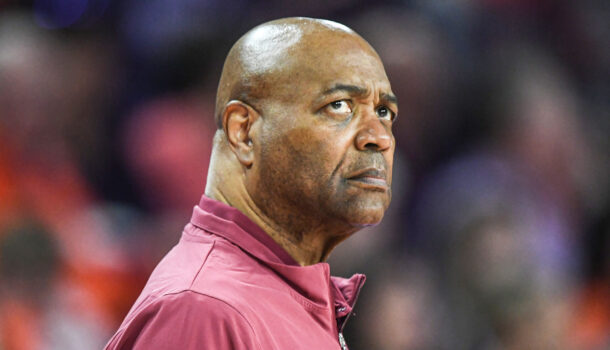
Leonard Hamilton’s departure is more than the end of an era. It’s a chance for the ACC to start anew
Florida State issued a statement Monday afternoon announcing that Leonard Hamilton will step down as the school’s basketball coach at the end of the current season.
The news comes on the heels of a 4-game losing streak, punctuated by an embarrassing setback at Boston College on Saturday in which the Seminoles coughed up a 4-point lead in the final 7 seconds.
The timing, however, is only coincidental.
Already in the final year of an expiring contract, the last few grains of sand have been trickling from the hourglass of Hamilton’s 23-year tenure since last month when 6 of his former players sued him over promised name, image and likeness payments they say they never received.
At that point, it became more a matter of when, not if, the 76-year-old coach would either retire or be fired.
Hamilton won’t be made available to comment on his decision – or even if it was his decision – until after Tuesday night’s game against Notre Dame.
Even then, there’s not much more he can say than the canned quote included in Monday’s release: That he’s “blessed beyond words for the opportunity and the experience” he’s had in Tallahassee and that he walks away “with no regrets.”
Well, maybe at least one regret.
While Hamilton leaves after having won 3 ACC Coach of the Year awards, FSU’s first-ever conference tournament championship in 2012, its first regular-season title 8 years later and more victories than anyone in school history, he was never able to lead his team to a Final Four.
His best chance of getting there, with a Seminoles team that went 26-5 and was poised to make a deep postseason run in 2020, was spoiled by the COVID pandemic that led to the cancellation of the NCAA Tournament.
That disappointment triggered a steady downhill slide during which Hamilton, like fellow old-school ACC coaches Roy Williams, Jim Boeheim, Tony Bennett and Jim Larrañaga, struggled to adapt to the rapidly changing landscape of college athletics.
After bottoming out at 9-23 three seasons ago, he tried to embrace the new realities of the transfer portal and NIL. But if the allegations of former Seminoles Darin Green Jr., Josh Nickelberry, Primo Spears, Cam’Ron Fletcher, De’Ante Green and Jalen Warley that he made financial promises he couldn’t keep are true, he went about it a little too hard.
Only time will tell how much of a stain the lawsuit and the recent dropoff will leave on a Hall of Fame-worthy career that has seen him break the college coaching color barrier, spend time in the NBA and earn 656 victories. His 434 wins at FSU, including 13 this season, are the fifth-most in ACC history behind only Duke’s Mike Krzyzewski, North Carolina’s Dean Smith and Roy Williams and Maryland’s Gary Williams.
For better or for worse, Hamilton’s departure marks the end of an era.
He’s the last man standing from a golden generation of ACC coaches that included Krzyzewski, Roy Williams, Jim Boeheim, Tony Bennett, Mike Brey and Larrañaga – all of whom have left since 2021. Brad Brownell, with 282 wins in 15 seasons at Clemson, is now the conference’s longest-tenured coach.
The vacuum created by their absence has been a major contributing factor to the league’s recent decline. Exactly half of the ACC’s 18 current teams are at .500 or below this season and the league’s .652 nonconference winning percentage (129-69) is its worst since 1968-69.
But even amid the gloom and doom accompanying the ACC’s dramatic fall, there is legitimate reason for optimism.
The high-profile openings at FSU and Miami, and perhaps 1 or 2 others once the season is done, give the conference an opportunity to replenish its coaching ranks and begin the climb back up the college basketball food chain. There’s already been an upgrade with Louisville’s hiring Pat Kelsey and Andy Enfield arriving with SMU’s entry into the league.
Both have their teams in line for NCAA Tournament bids.
But the momentum will only continue if the Seminoles and Hurricanes are serious about restoring their basketball programs, and the ACC along with them, back to prominence.
That means avoiding the mistakes of rivals Louisville, Syracuse and North Carolina, each of whom stayed within their respective “families” by gambling on untested first-timers, and diverting at least some funds away from football to attract experienced coaches with a track record for success and a firm handle on how programs are built and maintained in the 2020s.
Award-winning columnist Brett Friedlander has covered the ACC and college basketball since the 1980s.







